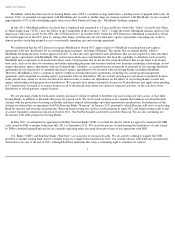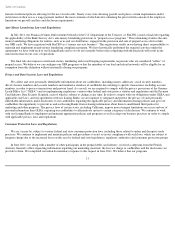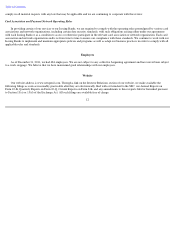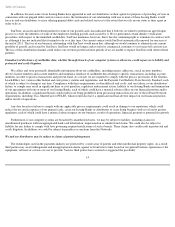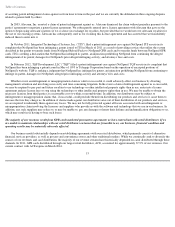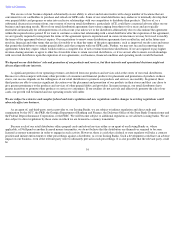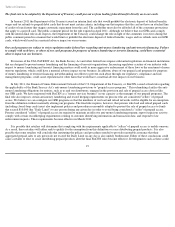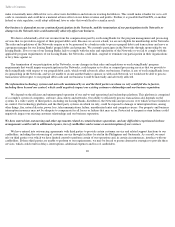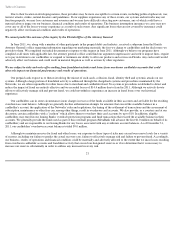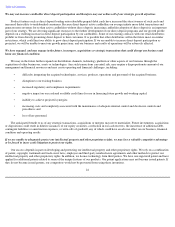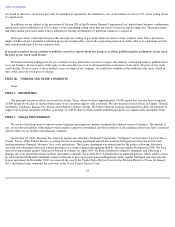NetSpend 2011 Annual Report Download - page 21
Download and view the complete annual report
Please find page 21 of the 2011 NetSpend annual report below. You can navigate through the pages in the report by either clicking on the pages listed below, or by using the keyword search tool below to find specific information within the annual report.
Table of Contents
unsuccessful in making a persuasive argument that it should not be subject to such licensing requirements, and therefore could be deemed to be
in violation of one or more of the state money transmitter statutes. Such failure to comply could result in the imposition of fines, the suspension
of the relevant party's ability to offer some or all of our GPR cards and related services in the relevant jurisdiction, civil liability and criminal
liability, each of which would likely have a material adverse impact on our revenues.
State and federal legislatures and regulatory authorities have become increasingly focused upon the regulation of the financial services
industry and continue to adopt new legislation which could result in significant changes in the regulatory landscape for financial institutions
(such as our Issuing Banks) and other financial services companies (including our business). For example, the establishment of the federal
Consumer Financial Protection Bureau will likely expose us to increased regulatory oversight and possibly more burdensome regulation and
have an adverse impact on our revenue and profits. Additionally, changes to the disclosures which must be provided with our products and
services or limitations placed on the overdraft and other fees associated with them could negatively impact our financial position by increasing
our costs and reducing our revenue. Furthermore, states may adopt statutes which could limit the application of certain fees or otherwise
increase the costs incurred, or negatively impact the revenue received, by our Issuing Banks in connection with the provision of our prepaid
debit cards, which would have an indirect adverse impact on our revenue. Finally, if the federal or one or more state governments impose
additional legislative or regulatory requirements on us, our Issuing Banks or our distributors, or prohibit or limit our activities as currently
conducted, we may be required to modify or terminate some or all of our products and services offered in the relevant jurisdiction or certain of
our Issuing Banks may terminate their relationship with us, which in turn could adversely affect our business. Any failure, or perceived failure,
by us, our Issuing Banks or our distributors to comply with all applicable statutes and regulations could result in fines, penalties, regulatory
enforcement actions, civil liability, criminal liability, and/or limitations on our ability to operate our business, each of which could significantly
harm our reputation and have a material adverse impact on our business, results of operations and financial condition.
In 2010, the FRB issued a final rule implementing Title IV of the Credit Card Accountability, Responsibility, and Disclosure Act of 2009,
or CARD Act, which imposes requirements relating to disclosures, fees and expiration dates that are generally applicable to gift certificates,
store gift cards and general-use prepaid cards. We believe that our GPR cards, and the maintenance fees charged on our GPR cards, are exempt
from the requirements of this rule, as they fall within an express exclusion for cards which are reloadable and not marketed or labeled as a gift
card or gift certificate. However, this exclusion is not available if the issuer, the retailer selling the card to a consumer or the program manager
promotes, even if occasionally, the use of the card as a gift card or gift certificate. As a result, we provide retailers with instructions and
policies regarding the display and promotion of our GPR cards. It is possible, however, that despite our instructions and policies to the
contrary, a retailer engaged in offering our GPR cards to consumers could take an action with respect to one or more of the cards that would
cause them to be viewed as being marketed or labeled as a gift card. In such event, it is possible that our GPR cards would lose their eligibility
for such exclusion to the CARD Act and the rule's requirements and therefore our program could be deemed to be in violation of the CARD
Act and the rule. Such a violation could result in the imposition of fines, the suspension of our ability to offer our GPR cards, civil liability,
criminal liability and the inability of our Issuing Banks to apply certain fees to our GPR cards, each of which would likely have a material
adverse impact on our revenues.
17


